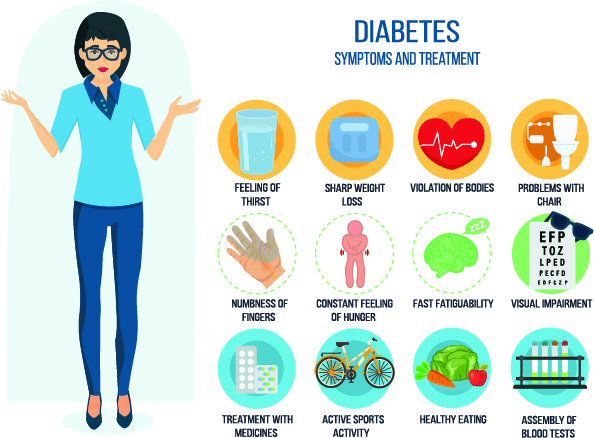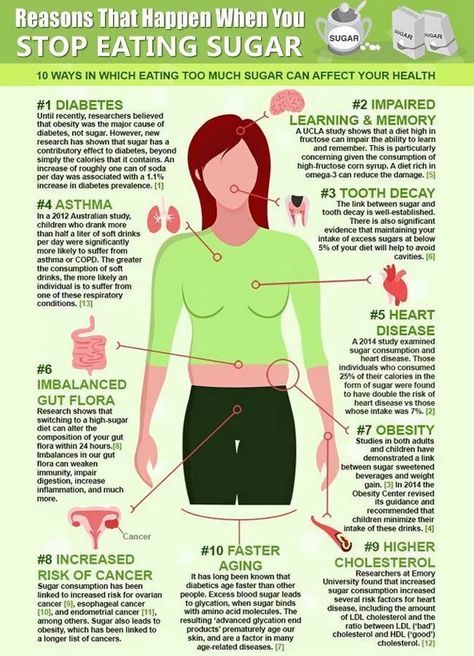Youre Getting Yeast Infections More Often Than Usual
Hyperglycemia may lead you to get more frequent genital yeast infections. The culprit is often a type of yeast known as Candida albicans, per the ADA. According to the Centers for Disease Control and Prevention, in females the symptoms can include: vaginal itching, redness or soreness pain during sexual intercourse pain or discomfort during urination and thick, abnormal vaginal discharge. While yeast infections are common in people who dont have diabetes, having more glucose in your blood puts you at higher risk of getting them. The yeast feeds off the glucose, and if your blood sugar is high theres more glucose in the urinary tract, explains Bandukwala. Uncircumcised men with hyperglycemia are also at risk, he says.
Were also seeing this happen a little more now with patients who take SGLT-2 inhibitors, which force the body to expel more glucose through the urine, the endocrinologist adds. The FDA has added a warning to the prescribing information for SGLT-2 inhibitors about a far more rare and potentially fatal genital condition, known as necrotizing fasciitis of the perineum, or Fourniers gangrene .
Moodiness Spikes And Crashes
When you eat sugar, your insulin levels spike as your body makes an effort to regulate blood sugar levels. Once the effects wear off, however, you experience a dramatic blood sugar drop, which can leaves you drained, lethargic and irritable. Serious sugar eaters often complain that they feel chronically tired and sluggish. Couple this with a lack of essential nutrients like protein and fibre, and the situation only turns from bad to worse. Reach for natural sugars in fruits or natural energy boosters instead.
Swollen Or Bleeding Gums Which Increase Your Infection Risk
Gum disease is a complication of diabetes, notes the National Institute of Diabetes and Digestive and Kidney Disease. It can also make diabetes harder to control, because the bodys response to infection is to release more glucose into the bloodstream, according to the ADA.
Your saliva contains glucose and the more it contains, the more there is to feed the bacteria that combine with food in your mouth to form plaque and cause gum disease. Symptoms can include red or inflamed gums at first. If they are unaddressed, they can progress to periodontitis, which can cause your gums to pull away from your teeth, the appearance of pus or ulcers, or even tooth loss, notes the Mayo Clinic. Get your blood sugar under control and see a dental professional to prevent damage to your gums and teeth.
Additional reporting by Diana Rodriguez and Andrea Peirce.
Also Check: Hypertriglyceridemia Low Carbohydrate Diet
Managing Your Diabetes Devices
If you are using an insulin pump, talk to your diabetes team about how to best manage hyperglycemia. In general, be sure to check your pump first. Make sure all parts are connected and working correctly. Check your bolus history and temporary basal rate. Also check your insulin to make sure it has not expired or gotten too warm.
If you use a CGM, try not to react to it too often. You might be tempted to give another dose of insulin too soon, before the first one finishes working, which is known as stacking insulin this can cause low blood sugar .
Can You Get Diabetes From Eating Too Much Sugar

How does a person get diabetes? One common belief is that you can develop diabetes from eating too much sugar.
Its not as simple as eating too much sugar can cause diabetes, says Ayushi Dixit, M.D., an endocrinologist at Pascack Valley Medical Center. Since glucose levels are elevated in diabetes, it is assumed that eating sugary foods causes the disease. However, type 2 diabetes, the most common form, is a combination of insulin resistance and pancreatic failure.
Recommended Reading: Diabetes Cottage Cheese
Youre Experiencing Digestive Issues And Irregular Bowel Movements
Some research suggests that sugar might decrease the diversity of healthy bacteria in your gut within as little as a week, making your digestive system sluggish. Too much white sugar wont help you if youre trying to promote healthy bacteria in your system, adds Zeitlin. Foods naturally high in fiber have a positive impactand people eating lots of sugar generally arent eating a lot of fiber, says Ansel.
You Have To Give Up Desserts If You Have Diabetes
MYTH. You could:
- Cut back. Instead of two scoops of ice cream, have one. Or share a dessert with a friend.
- Consider using low-calorie sweeteners. Keep in mind, there might be a few carbs in these.
- Expand your horizons. Instead of ice cream, pie, or cake, try fruit, a whole wheat oatmeal-raisin cookie, or yogurt.
- Tweak the recipe. For instance, you can often use less sugar than a recipe calls for without sacrificing taste or consistency.
Recommended Reading: Side Effects For Metformin
What Happens In Your Body
With diabetes, eating too much sugar can cause more than just the jittery feelings of a sugar high. It can cause several other symptomsand it’s important to understand what you’re feeling, and to understand what is happening in your body.
After consuming an excess amount of sugar, you might enter a state of hyperglycemia. Hyper means high or above, and glycemia refers to the amount of glucose in the blood. Being in a state of hyperglycemia cause a few different things to happen. A common symptom people with diabetes experience is intense thirstthey feel like they can’t get enough to drink. This is called polydipsia. Paired with polydipsia, you may also experience polyuriathe frequent need to urinate. These are both tell-tale signs that your blood sugar is high. Further, you may experience headache, blurred vision, and possible feelings of fatigue.
If you are experiencing any of these symptoms, I recommend checking your blood glucose. If you monitor your blood sugar , your blood sugar will likely be above 180 mg/dL after a sugar binge. This value can be different for different people and it’s important to talk to your doctor or endocrinologist about your unique blood sugar targets.
You’re Struggling To Lose Weight
While sugar in and of itself doesn’t necessarily in and of itself make the pounds pile on, it can keep you from losing them or maintaining a healthy weight. Weight gain, of course, happens when you eat too much of anything. “But the amount of research linked to sugar and weight gain is undeniable,” says Zeitlin. Food with loads of white sugar make you feel less satisfied, so you’re more likely to eat more calories per meal.
On the other hand, complex carbs , healthy fats , and lean protein take your system longer to digest, keeping your blood sugar levels stable and you feeling fuller faster and for longer. “If you have a candy bar at 4 p.m., you’ll feel full for short while, but in a couple of hours you’ll feel hungrier than if you had an apple,” says Ansel.
Read Also: Advantages And Disadvantages Of Metformin
What Happens When A Diabetic Dog Eats Too Much Or Not Enough
With diabetes it is all about balance.
- Eating the same amount of food at pretty much the same time every day
- Taking insulin on schedule
- Maintaining the same level and amount of exercise every day
Too much of either/all of the above can be dangerous.
Mild hyperglycemia is always better than hypoglycemia , so its extremely important for your diabetic dog to eat. Too much food can elevate glucose to higher levels than are safe, causing what we already discussed more peeing more drinking dehydration.
By the same token, failure to eat leads to low levels which can put your dog at risk for
- Blurred vision
- Weakness, low energy, loss of consciousness
- Seizures
Exercising your dog too intensely can also cause a drop in glucose levels.
How Does Sugar Play A Part In Developing Type 2 Diabetes
The question remains: Does eating too much sugar cause diabetes? Actually, eating too many carbohydrates can increase blood glucose, leading to Type 2 diabetes. And sugar is a carbohydrate, as are many foods: milk, cheese, yogurt, pasta, rice, bread, fruit, potatoes, and other starchy vegetables.
And how many carbs are too many? It all depends on the type of carbohydrates youre consuming.
In an article published in the journal Diabetes Care, researchers note that nutrition therapy helps control and prevent diabetes. This nutritional food plan works by limiting carbs, so people with diabetes dont need to worry about measuring and counting. It can also help prevent diabetes, especially in people diagnosed with prediabetes.
To make mealtime simple, the association developed the Diabetes Plate Method of eating. With this method, meals feature a healthy balance of vegetables, proteins, and carbohydrates portioned on a dinner plate.
No matter what method you follow to get your carbs and overeating under control, its best to discuss any diet plan with your doctor first.
Don’t Miss: Does Metformin Lower A1c
You Feel Tiredness And Fatigue Constantly
Fatigue and extreme tiredness are symptoms of uncontrolled blood sugar, the ADA says. Simply put, when your body is not processing insulin properly or it doesnt have sufficient amounts of insulin, the sugar is staying in our blood rather than getting into our cells to be used for energy, Zanini says. Also, frequent urination can lead to dehydration, which Bandukwala identifies as another contributing factor to fatigue.
What Are The Risks Of Hyperglycemia

Hyperglycemia can be a sign that your body isnt getting enough insulin. It is normal for patients with T1D to get hyperglycemia, and most of the time this is simply treated with insulin. If the body does not have insulin for approximately 8 hours, you could develop a condition called diabetic ketoacidosis, or DKA.
In DKA, your body breaks down fat for energy because it doesnt have enough insulin to use the sugar in your blood. This produces chemicals called ketones, which make your blood more acidic.
DKA is dangerous. Too much acid in your blood can make you pass out or even cause death.
Recommended Reading: Blood Sugar Too High Symptoms
What Is Diabetic Ketoacidosis
When the body doesn’t have enough insulin, glucose stays in the blood and can’t get into the body’s cells to be used for energy. This can happen, for example, when someone skips doses of insulin or when the need for insulin suddenly increases and the doses are not adjusted.
When the body can’t use glucose for fuel, it starts to use fat. When this happens, chemicals called ketones are released into the blood. Some of these ketones, like extra glucose, pass out of the body through the urine.
High levels of ketones in the blood can be a problem because they cause the blood to become acidic. Too much acid in the blood throws off the body’s chemical balance and causes the symptoms listed below. In people with diabetes, this problem is called diabetic , or DKA. DKA is a very serious condition that can lead to coma or death if it’s not treated. The good news, though, is that it’s preventable and can be treated.
DKA happens more often in people with type 1 diabetes, but can sometimes also happen to those with type 2 diabetes.
People With Diabetes Need Low Gi Foods
The glycaemic index is a useful tool for people with diabetes to help regulate their glucose levels. People with type 2 diabetes need the glucose in their diet to be absorbed slowly. They need to eat foods with a low GI. At least one low GI food is recommended at each meal.The quantity of carbohydrate foods eaten will also affect blood glucose levels. Talk to your dietitian about the recommended quantities of carbohydrate-based foods you need.People respond differently to different foods, regardless of the foods glycaemic index. If you have diabetes, you will need to monitor your blood glucose levels regularly.
Don’t Miss: Does Metformin Lower Your A1c
Why Does A Diabetic Need To Eat Salt What Happens If You Stop Eating Salt
To begin with, your food does not taste good without salt in it. So, people eat salt for taste for the starters. Salt is also an essential nutrient that your body cannot survive without. Salt helps maintain blood pressure which is vital to ensure blood reaches various body parts. Your body uses salt to balance blood fluids and maintain proper functioning of nerves, muscles etc. Your body cannot transmit nerve impulses or contract and relax muscle fibres without salt. So, you cannot cut salt completely from your diet. Humans need salt to live.
Eating Too Much Sugar Might Lead To Type 2 Diabetes
One especially harmful thing that can result from chronically eating too much sugar is that you can develop type 2 diabetes. That’s because, in order to deal with the extra sugar, your pancreas works overtime making insulin, causing your blood sugar level to spike. “Glucose levels buildup in the bloodstream and the body pulls water from muscles and other tissues to flush the toxic levels out,” Dr. Ralph E. Holsworth told The List. “Sugar ‘spills’ over into the body’s urine requiring the kidneys to work harder. Physicians in ancient times tasted urine, and a sweet taste indicated the patient had diabetes.” And while there are more hygienic ways to test for that now, the outcome remains the same.
Type 2 diabetes is not something to be taken lightly, either, as it can be dangerous, especially when it’s not well-managed. “Diabetic ketosis is an extreme life-threatening state in diabetic patients who cannot produce insulin,” Holsworth continued. “Blood glucose levels spike with extreme dehydration requiring immediate hospitalization, fluid management and glucose control with IV insulin.” That does not sound pleasant at all!
Read Also: Can Metformin Be Taken Without Food
Sweet On The Sweet Stuff
You drink a flavored latte. One moment youre wired the next, youre making a beeline to the couch. What gives? Youve just downed too much sugar. Your body goes on a physical and emotional roller coaster after having too much of the sweet stuff. The minute you put a sweet in your mouth, you get a surge of dopamine, a feel-good hormone with addictive properties, says Amanda Bontempo, RD, a nutritionist at NYU Langones Laura and Isaac Perlmutter Cancer Center. But the high doesnt last.
Can Eating Sugar Make My Diabetes Worst
Eating more sugar than your body can turn into energy will increase your blood sugar, which can intensify the complications that are caused by diabetes. Although sugar alone doesnt cause the diabetes, it can cause it to progress and cause complications such as:
- Kidney disease
- High in fat
- High in carbohydrates
Add all of these things together, and you really are looking at a disaster. While fresh foods are always best, its ok to splurge in fast food every once in a while. If you are on a road trip and your only option for eating is fast food, its understandable.
Ask to see their nutrition information before you order or look it up online. Many fast food chains now offer options that are fairly healthy.
Also Check: Can Apple Cider Vinegar Lower A1c
Does Not Having Symptoms Mean Diabetes Is Being Managed Well
Blood sugar control is crucial when youre living with type 2 diabetes. Dips and spikes can not only make you feel cranky and sluggish, but they can also wreak havoc on your personal health.
The most serious effects of blood sugar swings are a higher risk for diabetes-related health complications such as stroke, heart disease, and nerve damage .
For the record, the American Diabetes Association notes that you have diabetes if one of the following applies to you:
- Your blood glucose after fasting is 126 milligrams per deciliter or higher.
- Your blood glucose two hours after eating a meal is 200 mg/dl or higher.
- Your hemoglobin A1C is 6.5 or higher.
The tricky part is that with type 2 diabetes you may not feel it when blood sugar levels are too high, according to the ADA. It feels different for everyone. Not everyone will have the same symptoms, and some individuals will have no symptoms at all, says Lori Zanini, RD, CDE, a Los Angelesbased former spokesperson for the Academy of Nutrition and Dietetics.
RELATED: The Best and Worst Foods to Eat in a Type 2 Diabetes Diet
Because blood sugar management is so important to your overall health with type 2 diabetes, you need to take action if you think your levels may be out of control, even if youre feeling totally fine.
Fruit Doesn’t Taste Sweet Enough

Eating sugar too frequentlyâincluding adding sugar or even sugar substitutes like Splenda to certain foodsâcan alter what your taste buds interpret as sweet. “A bowl of strawberries is sweet on its own, but if you sprinkle sugar or Stevia on it, your baseline for sweet is so much higher than the fruit on its own,” says Zeitlin. “It changes your expectation of how a dessert should taste.” Cutting out added sugars and fake sweeteners as often as possible helps reteach your body to enjoy the natural sweetness of the fruit.
Also Check: Medications That Cause High Blood Sugar
Dental Cavities And Decay
The bacteria that live in your mouth and on your teeth and gums feed on sugar from the foods you eat. When they eat sugar, they produce acid that can destroy the enamel on your teeth. Over time, the acid and destruction to the enamel can lead to cavities and dental damage.
The more sugar you eat, the greater your risk for dental damage, according to the World Health Organization . Lower rates of dental decay are seen in people with the lowest level of daily sugar intake.

